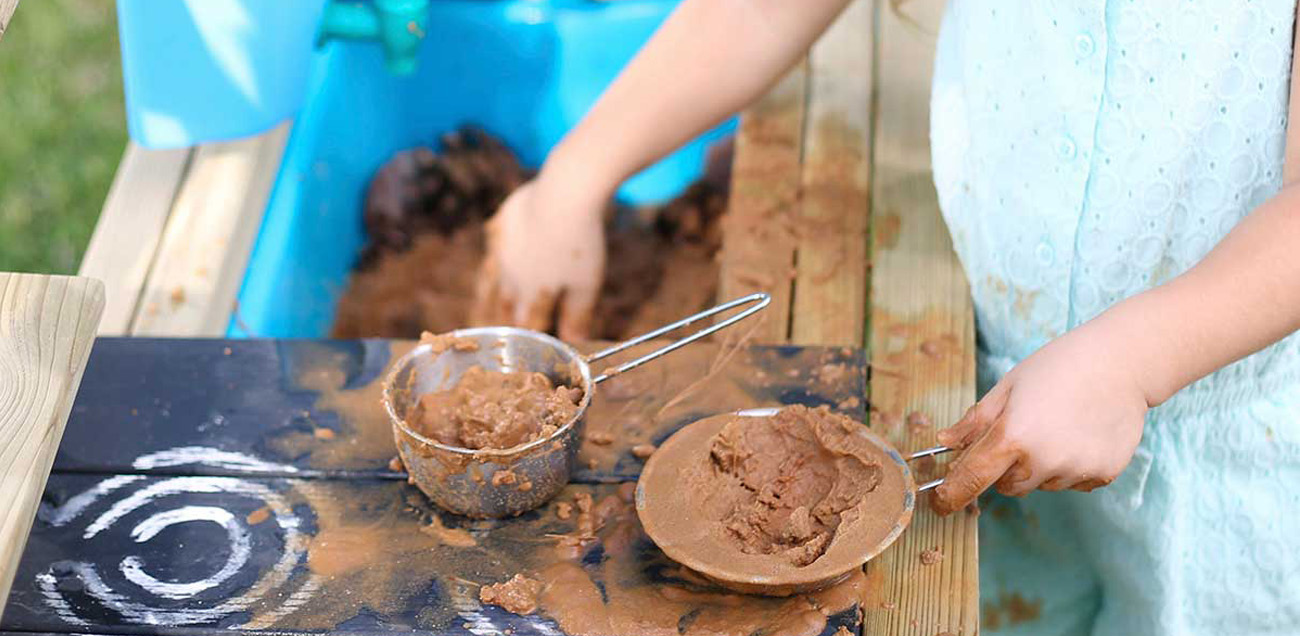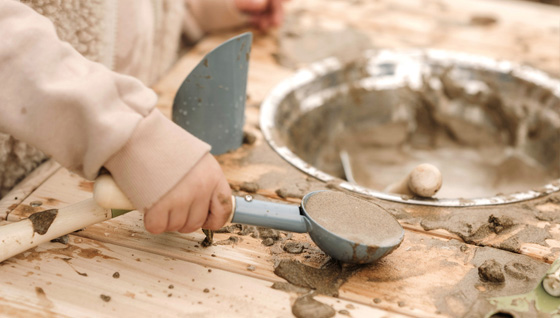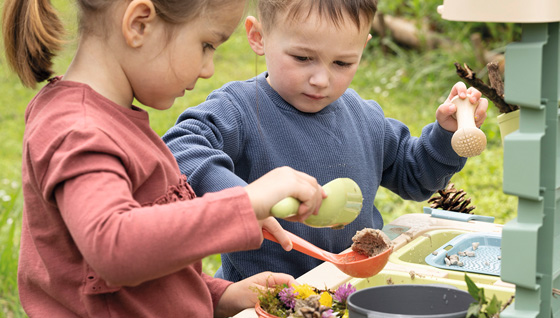What is a Mud Kitchen?
6 min read
Last Modified 26 June 2025 First Added 26 June 2025

Welcome to the captivating world of mud kitchens, where playtime transforms into a delightful, earthy adventure that sparks curiosity and inspiration. Embrace children’s limitless creativity and expand their imaginations as they explore nature’s vibrant colours and distinctive textures.
Mud kitchens encourage children to engage in sensory-rich experiences with natural materials like soil, leaves, plants, grass and water to concoct unique recipes and mimic real-life kitchen activities. Mud kitchens usually include countertops, pots, utensils, and pretend sinks or stoves. However, a mud kitchen is much more than a dirt-covered playground; it’s a hub of imagination and personal growth for your little one. These spaces are crucial in encouraging imaginative outdoor play, enhancing social interactions, and nurturing fundamental skills vital for development.
From mixing mud pies to crafting elaborate imaginary feasts, children can engage in various activities that entertain, support their motor skills and aid sensory development. Read on and uncover the magic of mud kitchens!

Mud kitchens are a fantastic outdoor learning resource for children from 18 months to around 8 years old. They help to encourage independence and imaginative play, allowing children to explore nature by engaging creatively with natural materials and role-playing activities seen in real kitchens, such as mixing, pouring, and measuring. Let’s explore some more of the benefits:
Imaginative play allows children to explore different scenarios in their mud kitchens, such as ‘running a mud café’ or ‘cooking a mud meal’. Children can develop their language skills through this creative exploration and make meaningful connections to real-world experiences. They can also engage in role-play, supporting emotional and social development by encouraging peer interactions, cooperation, and communication. This messy play also nurtures problem-solving skills as children navigate their invented scenarios. Children who participate in imaginative play develop a deeper understanding of social roles and the dynamics of interactions in various settings, enhancing their social and emotional intelligence.
Playing in a mud kitchen is an excellent way for children to build and enhance their social skills. The environment naturally fosters teamwork and cooperation as children share tools, ingredients, and ideas. In this setting, children learn the importance of taking turns, conflict resolution, and working together to create something uniquely their own. These activities also promote role negotiation, requiring children to discuss, compromise, and collaborate effectively, which are crucial social skills. As children experiment with different games and concoctions, they gain confidence in their ideas and abilities.
Mud kitchens are a great way to develop children’s fine and gross motor skills. Stirring, pouring, and scooping enable children to enhance their precision and hand-eye coordination. Using small kitchen utensils such as spoons and tongs helps children develop hand and wrist muscle strength, which forms the foundation of fine motor skills. Children can develop their gross motor skills by handling heavy pots and jugs that contain mud or water. The wide range of mud kitchen equipment, including pans and shovels, enables children to discover multiple ways of gripping and mixing, which helps advance their motor skills.
Mud kitchens use natural materials to create distinctive sensory experiences. Children can explore a variety of textures, smells, and sounds. This sensory exploration helps children develop an understanding of the world around them, gaining insights through hands-on experiences that encourage learning through play.
Studies have shown a correlation between playing in mud and increased immune system health, suggesting that exposure to dirt and germs in a controlled outdoor environment encourages the development of a stronger immune response. Playing in mud can also naturally enhance mood through the beneficial bacteria found in soil, which help to release serotonin, potentially reducing stress and promoting relaxation.

Mud kitchens are a fantastic way to support imaginative play outdoors. Take a look at our fun mud kitchen activities to inspire your little one’s mind and create an exciting sensory experience:
Mud kitchens are designed with child safety in mind. They feature durable, fade-resistant, and wipeable worktops. Removable sink bowls allow for easy cleaning, promoting hygiene and upkeep. By applying safe practices, parents can create a safe and enjoyable environment for children to explore and create:
Browse our range of mud kitchens and let your child explore the exciting world of messy mud play!
Read our disclaimers